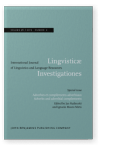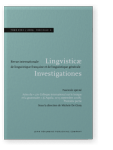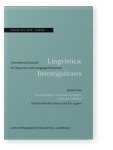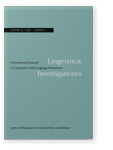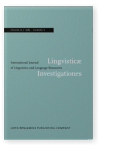Christian Molinier
List of John Benjamins publications for which Christian Molinier plays a role.
2013 Ainsi: Deux emplois complémentaires d’un adverbe type Adverbes et compléments adverbiaux / Adverbs and adverbial complements, Radimský, Jan and Ignazio Mauro Mirto (eds.), pp. 311–327 | Article
This article studies the adverb ainsi in its twin functions of manner adverb modifying a given verb, and of sentence adverb — here a connective. This dual functioning is characteristic of a number of adverbs, and as with them, all the characteristic properties of each of these types are verified.… read more
2009 Sur la nature et la structure des consécutives intégrées Actes du «27e colloque international sur le lexique et la grammaire» (L'Aquila, 10-13 septembre 2008). Première partie, De Gioia, Michele (dir.), pp. 163–175 | Article
This paper offers an analysis of the French integrated consecutive (result) construction, starting out from the correlative system observed in the ancient Indo-European languages, in particular the one which J. Haudry terms « dyptique inverse ». It is shown that the morpheme que, a relative marker,… read more
2003 Connecteurs et marqueurs énonciatifs: Les compléments figés formés à partir du nom propos Grammaires et Lexiques Comparés: Actes du Colloque, Conenna, Mirella and Éric Laporte (eds.), pp. 15–31 | Miscellaneous
Summary Two broad categories of frozen adverbial complements may be distinguished, organised around the noun propos in terms of the meaning taken on by this noun within these complements: namely, either «words expressed», «what is said», or «discourse topic», «what is being talked about». In the… read more
1991 Les Compléments Averbiaux du Français de Type A Vec N Lingvisticæ Investigationes 15:1, pp. 115–140 | Article
1985 Remarques sur une sous-classe d'adverbes en -ment orientés vers le sujet et leurs adjectifs Sources Lingvisticæ Investigationes 9:2, pp. 321–341 | Article
Remarks on a subclass of subject-oriented adverbs and their adjectival sources. The author first intends to describe the syntactic properties of subject-oriented sentence adverbs in -ment, as opposed to subject-oriented manner adverbs in -ment. He then discusses the status of two adjectival… read more
